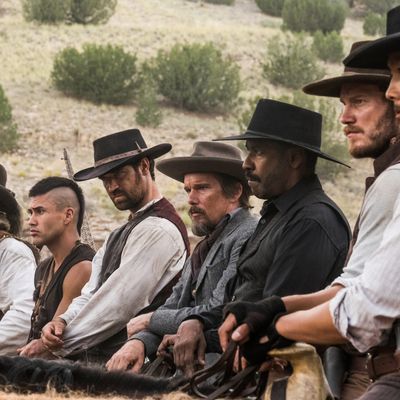
Antoine Fuqua’s remake of the 1960 Western The Magnificent 7 was chosen to open this month’s Toronto International Film Festival, which means that at least one important person liked it. It certainly looks and sounds like a classic wide-screen horse opera. Having been weaned on Westerns, I loved hearing the sound of wind blowing through a deserted town and boots echoing on a wooden porch and someone calling a bad guy a “yellow-bellied, sap-sucking coward.” I loved the sight of the star’s long, lean frame in black and the entrance he makes in the final battle sequence with his horse doing one of those marvelous sideways trots.
That it’s Denzel Washington is even better. The seven in 1960 were all white and hired to protect a town of poor Mexicans — all noticeably smaller in stature than our heroes — from a Frito Bandito played by Eli Wallach. This time they’re led by a black man and their ranks include a Mexican, a Native American, and a Korean. I’d have loved seeing a female gunslinger in their illustrious number — there were a few in the Old West, and this is not exactly a realistic film anyway — but at least it’s a woman (Haley Bennett) who takes the initiative when her husband is shot dead by the robber-baron villain Bartholomew Bogue (Peter Sarsgaard) to hire Washington’s Chisholm to save their God-fearing town. I also like the name Bartholomew Bogue.
The setup in which Chisholm gallops around various counties to assemble his team of gunfighters — none of whom will get rich off their impoverished clients — is irresistible, too, although the filmmakers have dropped a vital character: the hapless, semi-hysterical young man who idolizes these men and must prove himself worthy. Still, Ethan Hawke makes an amusing entrance as the old rebel smoothie Goodnight Robicheaux, who is experiencing a sort of delayed PTSD after killing his share of men and now serves as a showbizzy manager for an Asian knife virtuoso called Billy Rocks (Byung-Hun Lee). The other three are promising characters: Vincent D’Onofrio as a wild bear of a man who uses axes, Manuel Garcia-Rulfo as a wanted Mexican outlaw, and Martin Sensmeier as the Native American who has a predictable face-off with his opposite number, who kills for the bad guy.
The plot, of course, comes from one of the greatest films: Seven Samurai, directed by Akira Kurosawa — who was regarded in Japan as the most American-influenced of its filmmakers. It centers on an isolated town menaced by roving bandits and the samurai hired to defend it. It’s drenched in melancholy, since the samurai represent a dying feudal past, and the final battle takes place in a rainstorm that kicks up rivers of mud; the critic Pauline Kael called it “a tone poem of force.” John Sturges’s American transplant has a better reputation than it deserves. It’s full of Japanese-sounding observations about the evanescence of gun-fighters versus the permanence of people of the land that sound clunky in the mouth of the star, Yul Brynner — though Steve McQueen’s coolness is transcendent and the magnetic cast includes James Coburn, Robert Vaughn, and Charles Bronson.
Fuqua’s The Magnificent Seven has no larger theme — none. The industrialist villain, played by Peter Sarsgaard, wants to evict the population of the town to mine gold there. He makes speeches about capitalism having yoked religion to its ends and directs his men to burn down the church. Gold dust seems to have gotten into his brain like syphilis. He coughs and rails and kills. Washington’s Chisholm has a previous acquaintance with him. We don’t know exactly what it is until the end but can guess too easily. The characters in the previous iterations of this story were motivated by ideals and the need to do something that matters in a world that has forgotten them. This turns out to be just another formula revenge picture like so many others at the multiplex.
At least Pratt seems to enjoy having a supporting role in which he doesn’t need to carry the whole film but can play off the stoic — and a little dull — Washington. He flirts with the widow while supposedly teaching her to shoot (she turns out to be good already) and does his best to buck up Robicheaux, teasing the nervous ex-gunslinger into showing off his prowess before the townspeople. You want him to survive the climactic battle and find a measure of happiness.
Why don’t these characters — who represent different races and philosophies and attitudes toward killing and dying — get to mix it up on a deeper level? The stupid Suicide Squad had more probing conversations. But Fuqua’s direction has no intimacy — it’s too brisk, too metronomic. Without violence or its imminent threat, there’s nothing going on. And when the violence does come, it’s not memorable. One major character meets a wrenching, explosive end, but the rest of the time you can’t tell who’s shooting whom: Hordes of men fall off their horses and you only care about the horses.
The Magnificent Seven has the trappings of a classic Western and it hits its marks. All of Fuqua’s movies hit their marks — even sadistic formula junk like The Equalizer. But there’s no grandeur in its images or generosity in its soul. I don’t think Fuqua ever loved Westerns. And by the time this movie ended, I’d forgotten why I do.


